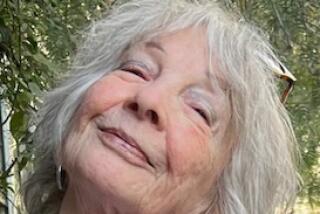Rubin Recalled as a Rebel of Many Causes : Remembrance: Long after shedding â60s activist image, he enjoyed defying authority.
Jerry Rubin, who abandoned the guerrilla garb of his Yippie past for the three-piece suits of capitalism, was hailed by former Chicago Seven associates Tuesday as a constructive rebel who challenged authority in a continuing search for a better world.
âThis Yippie-to-yuppie thing--I think he kind of reveled in that,â state Sen. Tom Hayden (D-Santa Monica) said Tuesday. âBut he had an inventive idea--participatory democracy applied to business. . . . His life was consistent. He was continuing to question conventional wisdom and authority.â
âHe started as a straight political activist, but he (later) chose a path that I do not believe in,â David Dellinger said from his home in northern Vermont. âIâm not agreeing with what he did, but I still respect what he has done, and I love him.â
Rubin, 56, died of cardiac arrest late Monday at UCLA Medical Center, two weeks after he was struck by a car while jaywalking across Wilshire Boulevard in front of his Brentwood penthouse.
Publicist Michael Sands, whose friendship with Rubin dated back to the 1960s, said Tuesday that when the two of them walked somewhere, Rubin almost always jaywalked.
Sands said that he, Rubin and Michael Ochs, brother of â60s singer Phil Ochs, had tea together at the Regent Beverly Wilshire in Beverly Hills one night and then began scampering back and forth across Wilshire Boulevard in front of the hotel.
âWe were like three little kids, running across the street,â Sands said. âWe would wait until it looked clear, and then we would yell, âLetâs go! Letâs go!â Then we would scoot across the street.â
Rubin âwas a great life force, full of spunk, courage and wit,â Hayden said late Monday. âI think his willingness to defy authority for constructive purposes will be missed. Up to the end, he was defying authority.â
Rubin--born to a union organizer and his wife in the 1930s and educated at UC Berkeley during the turbulent anti-war activism of the mid-1960s--burst into national consciousness in the late 1960s when he, the late Abbie Hoffman and Paul Krassner founded the rebellious Youth International Party, better known as the Yippies.
Rubin and Hoffman were major players in the wild anti-Vietnam War demonstrations that erupted outside the Democratic National Convention in Chicago in August, 1968. Black Panther leader Bobby Seale and seven other demonstrators--among them Rubin, Hoffman, Dellinger and Hayden--were charged with conspiracy to incite violence and crossing state lines with intent to riot.
Court proceedings began a year later, becoming known as the Chicago Seven trial after Sealeâs case was separated from the others. Seale was convicted of contempt of court and sentenced to four years in prison.
At the conclusion of the Chicago Seven trial, Rubin, Hoffman, Hayden, Dellinger and Rennie Davis were found guilty on charges of intent to riot and sentenced to prison, but their convictions were overturned.
Although some of the seven, such as Dellinger, remained outside the Establishment, others, such as Rubin and Hayden, began to evolve. While Hayden turned to conventional politics, Rubin tried est, yoga, bioenergetics, hypnosis and Rolfing.
By 1980, Rubin--who had once protested capitalism by dumping dollar bills onto the floor of the New York Stock Exchange--had joined the brokerage firm of John Muir & Co. Three years later, he opened a series of ânetworking salonsâ for ambitious, success-oriented yuppies.
In 1988, when he turned 50, Rubin revised the credo by which an entire generation had once defined itself:
âI used to say, âDonât trust anyone over 30,â â he told a reporter at his birthday party. âNow I say, âDonât trust anyone under 50.â â
âHe was enjoying himself, making money, putting people to work,â Hayden said. âBut behind that was a master plan consistent with his whole life.â
Rubin--who has the same name as a Venice activist--continued to prosper, becoming an independent marketer for a Dallas-based firm that sells a nutritional drink.
In February, the entrepreneurial Rubin, who estimated that he made about $600,000 in 1992, met with the other Jerry Rubin, who was making $6 an hour potting orchids while promoting anti-war activities for the L.A. Alliance for Survival.
The entrepreneur offered the other Rubin a job, promising to make him rich. The flower-potter said he would âthink it over.â
More to Read
Sign up for Essential California
The most important California stories and recommendations in your inbox every morning.
You may occasionally receive promotional content from the Los Angeles Times.










